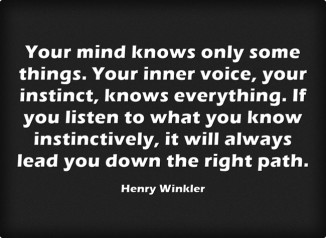 A while back, I was talking to a friend of mine about how it is that we often have a sixth sense about certain things and how often it is that we ignore that sixth sense. On one occasion, as her inner voice told her to be careful, she dismissed it and thought “I’m always careful.” On that particular day, she had to be extra-careful but instead, she dismissed the voice and in doing so, she put herself in an incredibly dangerous situation. This got me thinking of how many times I’ve done the same. I’ve ignored my inner voice and have forgotten that valuable rule of: “Always trust your instinct.” Our instinct serves a purpose. It’s there to protect us. I’m not saying that we should be fearful, but we should always trust that inner voice when it speaks to us.
A while back, I was talking to a friend of mine about how it is that we often have a sixth sense about certain things and how often it is that we ignore that sixth sense. On one occasion, as her inner voice told her to be careful, she dismissed it and thought “I’m always careful.” On that particular day, she had to be extra-careful but instead, she dismissed the voice and in doing so, she put herself in an incredibly dangerous situation. This got me thinking of how many times I’ve done the same. I’ve ignored my inner voice and have forgotten that valuable rule of: “Always trust your instinct.” Our instinct serves a purpose. It’s there to protect us. I’m not saying that we should be fearful, but we should always trust that inner voice when it speaks to us.
Not trusting my instinct has cost me dearly on more than one occasion. It cost my husband and me a pretty big financial and emotional loss about 6 years ago. Trusting my instinct on the other hand, has always given me a huge reward, like when we chose to move to this town where we now live. By not trusting my instinct, I allowed some negative people to enter my life last year. Trusting it however, made me aware of this and had me cut ties and move on.
Not trusting my instinct caused me to reach a very unhealthy weight a few years ago. Trusting my instinct empowered me to contact the best of the best in the industry of competitive fitness and through his coaching, heal my body from damage that could have otherwise been irreparable.
Trusting your instinct takes courage, because many times we hear arguments of what we “should” be doing. We often have to go against the crowd and swim upstream when others are telling us to go downstream. Trusting our instinct is the only thing that has worked for me EVERY.SINGLE.TIME. Not trusting it has gotten me in pretty big trouble EVERY.SINGLE.TIME.
So next time you’re faced with a situation in which you are asking yourself if you might be mistaken about that little feeling you’re getting that things aren’t right… instead of asking yourself “what if I’m mistaken?” Ask yourself instead “what if I’m right?”
